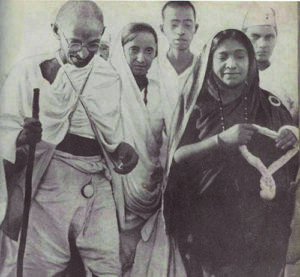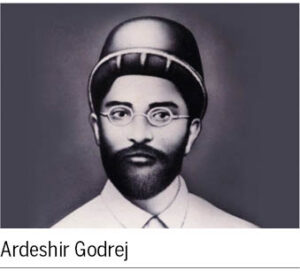Parsi Influences In Mahatma Gandhi’s Life
 Gandhi Jayanti, which falls on 2nd October, 2024, marking the 155th birth anniversary of the Mahatma Gandhi, celebrates his legacy of non-violence and trailblazing leadership in the nation’s fight for independence from British rule. Revered as the Father of The Nation, Mahatma Gandhi’s steadfast commitment to freedom and his role in promoting civil rights, continues to inspire millions around the world.
Gandhi Jayanti, which falls on 2nd October, 2024, marking the 155th birth anniversary of the Mahatma Gandhi, celebrates his legacy of non-violence and trailblazing leadership in the nation’s fight for independence from British rule. Revered as the Father of The Nation, Mahatma Gandhi’s steadfast commitment to freedom and his role in promoting civil rights, continues to inspire millions around the world.
Having studied Law at London’s University College, Gandhi initially worked in South Africa, where his experiences in fighting against racial discrimination, shaped his philosophy of ‘Satyagraha’ or non-violent resistance, which became instrumental in mobilizing the Indian populace against British colonialism.
As a visionary, Gandhi fought not only for India’s freedom against British Raj, but also against internal iniquities like the caste system, untouchability and other social evils. The six famous principles that he staunchly lived his life by were: Truth; Non-violence or Ahimsa; Vegetarianism; Brahmacharya or celibacy; Simplicity; and Faith in Divinity or a Higher Force. His unique leadership comprised political activism combined with spiritual principles, steering the crucial ‘Salt March’ and ‘Quit India Movement’, which reinforced his standing as a national icon. Though he was tragically assassinated on 30th January, 1948, his teachings and philosophy on peace and non-violence continue to influence movements for social justice worldwide.
While Gandhiji is immortalized for his leadership in India’s freedom struggle, not many are aware of the Parsi community’s contribution to Gandhiji’s struggle for India’s Independence…
 Dadabhai Naoroji
Dadabhai Naoroji
In 1888, a young Gandhi set sail to London from Mumbai to meet with the Grand Old Man of India – Dadabhai Naoroji, along with a letter of introduction written by a noted Maharashtrian medical practitioner. Being greatly in awe of Dadabhai, Gandhi felt underconfident approaching him without a letter of introduction, despite being reassured that being Indian was sufficient introduction. Dadabhai became a regular source of advice and inspiration to Gandhi, regularly exchanging hand-written letters. Gandhi would later say, “I have always been a hero-worshipper and Dadabhai became real Dada to me.”
Rustomjee Ghorkhodoo
Rustomjee Ghorkhodoo was the first friend that Mahatma Gandhi made when he was in South Africa. Rustomjee was a founder member of National Indian Congress and it was this Parsi who gave shelter to the young Mohandas Gandhi on 13th January, 1897, when he was attacked by a European mob in Durban. Had it not been for Rustomjee, Gandhi could have died in Durban. Rustomjee was one of the staunchest supporters of South Africa Satyagraha during 1907 to 1914. As a revolutionary he was also sentenced to jail.
Mithuben Petit
Mithu Petit was an active freedom fighter, and a great source of strength to Gandhi. Mithuben (as Gandhi would address her) was the daughter of the affluent, well-known industrialist – Sir Dinshaw Maneckji Petit. She played a major role in the Salt March, one of the most important events in the Indian Independence Movement, alongside Kasturba Gandhi and Sarojini Naidu. She also participated in the Bardoli Satyagraha (1928), a no-tax campaign against the British Raj, where she worked under the guidance of Sardar Patel.
Mithu also set up an ashram in Maroli, called ‘Kasturba Vanat Shala’, which taught underprivileged children, belonging to Adivasis, Harijans and fisher folk, the art of spinning, carding, weaving, dairy farming, leather-work and a Diploma Course in Sewing, making especially the women self-sufficient. She also established a hospital by the same name for the treatment of mentally ill patients.
 Ardeshir Godrej
Ardeshir Godrej
Ardeshir Godrej, a venerated founder of the Godrej Group, contributed a sum of Rs. 3,00,000/- for uplifting Harijans (then considered untouchables), at a time when donations of such scale were unheard of. Gandhiji acknowledged this donation as the largest contribution to that cause which was close to his heart.
Excerpts From Gandhiji’s Address To Parsis (published in Young India, dated 23rd March, 1921):
“Apart from your being fellow-countrymen, I am bound to you by many sacred ties. Dadabhai (Dadabhai Naoroji) was the first patriot to inspire me. He was my guide and helper when I did not know any other leader. It was to him that I bore, when yet a boy, a letter of introduction.
It was the late uncrowned king of Bombay, Sir Pherozeshah Mehta, who led me in 1896 and showed me the way to work. It was he who, (when I wanted to battle a Political Agent as far back as 1892), restrained my youthful ardour and taught me the first practical lesson in Ahimsa in public life. He taught me not to resent personal wrongs if I would serve India.
A Parsi merchant in Durban, Rustomjee Ghorkhodoo, was among my most valued clients and friends in South Africa. He gave freely to public causes, and he and his brave son were the first among my fellow prisoners. He gave me shelter when I was lynched, and now, too, he is following the Swaraj movement with considerable interest and has just donated Rs. 40,000/- to it.
In my humble opinion, probably the first woman in India today is a Parsi woman (presumably Gandhiji refers to Mrs. Jaijee Petit, wife of Jehangir Bomanjee Petit) gentle as a lamb, with a heart that holds the whole of humanity. To have her friendship is the rarest privilege of life.”
Little wonder then, Gandhiji had said about Parsis, “In numbers Parsis are beneath contempt, but in contribution, beyond compare!”
As we pay our respects to the Father of the Nation, and honour his unparalleled legacy, on Gandhi Jayanti, let’s pledge to follow in his footsteps of truthfulness, peace, kindness, simplicity and peace; and commit ourselves, as free citizens of the largest democracy in the world, to uphold the values he championed, furthering a peaceful and compassionate world for our future generations.
- જેજે હોસ્પિટલના પારસી વોર્ડમાં નવરોઝની ઉજવણી - 5 April2025
- ઝોરોસ્ટ્રિયન વિમેન્સ એસોસિએશન ઓફ સુરત દ્વારા પાણી બચાવો પર્ફોર્મન્સ - 5 April2025
- આવાં યઝદના પરબની ઉજવણી - 5 April2025
